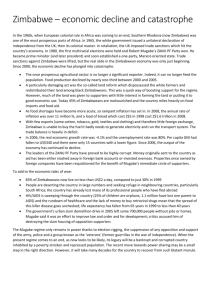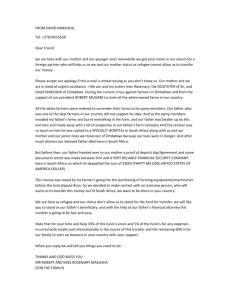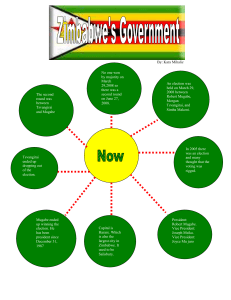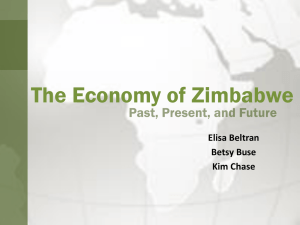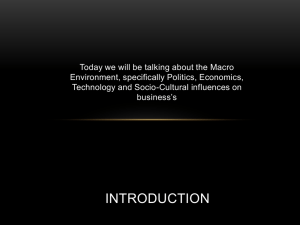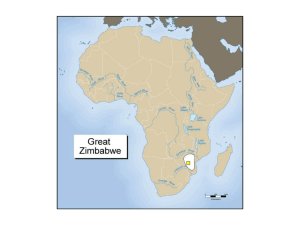Testimony before the Senate Foreign Relations Subcommittee on African Affairs
advertisement
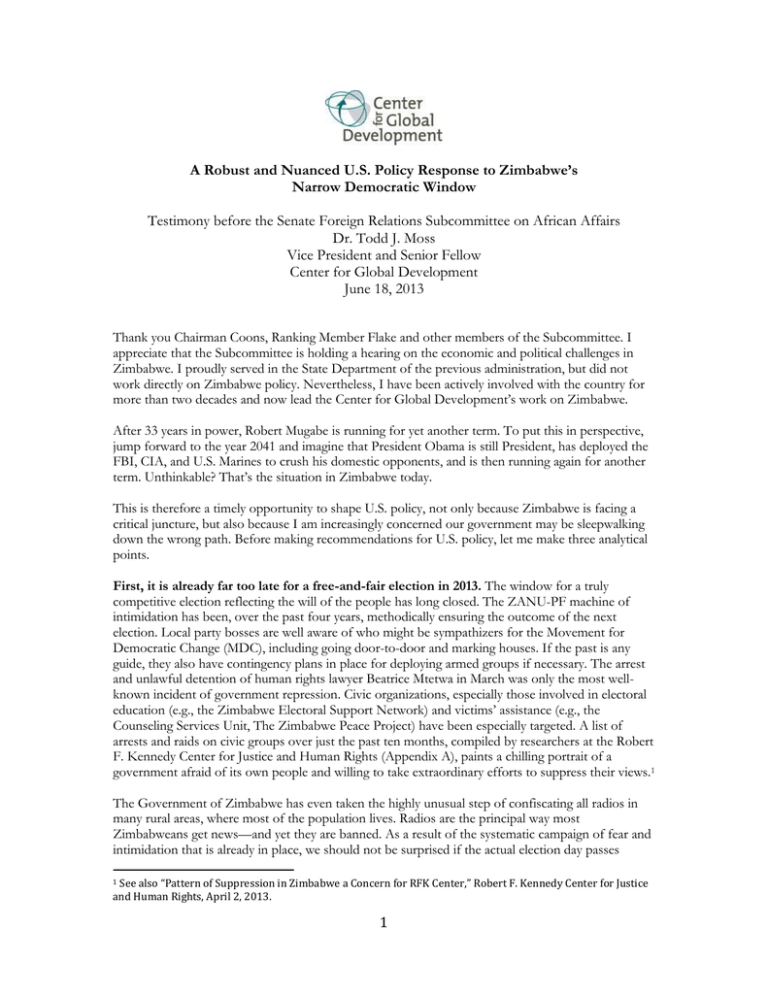
A Robust and Nuanced U.S. Policy Response to Zimbabwe’s Narrow Democratic Window Testimony before the Senate Foreign Relations Subcommittee on African Affairs Dr. Todd J. Moss Vice President and Senior Fellow Center for Global Development June 18, 2013 Thank you Chairman Coons, Ranking Member Flake and other members of the Subcommittee. I appreciate that the Subcommittee is holding a hearing on the economic and political challenges in Zimbabwe. I proudly served in the State Department of the previous administration, but did not work directly on Zimbabwe policy. Nevertheless, I have been actively involved with the country for more than two decades and now lead the Center for Global Development’s work on Zimbabwe. After 33 years in power, Robert Mugabe is running for yet another term. To put this in perspective, jump forward to the year 2041 and imagine that President Obama is still President, has deployed the FBI, CIA, and U.S. Marines to crush his domestic opponents, and is then running again for another term. Unthinkable? That’s the situation in Zimbabwe today. This is therefore a timely opportunity to shape U.S. policy, not only because Zimbabwe is facing a critical juncture, but also because I am increasingly concerned our government may be sleepwalking down the wrong path. Before making recommendations for U.S. policy, let me make three analytical points. First, it is already far too late for a free-and-fair election in 2013. The window for a truly competitive election reflecting the will of the people has long closed. The ZANU-PF machine of intimidation has been, over the past four years, methodically ensuring the outcome of the next election. Local party bosses are well aware of who might be sympathizers for the Movement for Democratic Change (MDC), including going door-to-door and marking houses. If the past is any guide, they also have contingency plans in place for deploying armed groups if necessary. The arrest and unlawful detention of human rights lawyer Beatrice Mtetwa in March was only the most wellknown incident of government repression. Civic organizations, especially those involved in electoral education (e.g., the Zimbabwe Electoral Support Network) and victims’ assistance (e.g., the Counseling Services Unit, The Zimbabwe Peace Project) have been especially targeted. A list of arrests and raids on civic groups over just the past ten months, compiled by researchers at the Robert F. Kennedy Center for Justice and Human Rights (Appendix A), paints a chilling portrait of a government afraid of its own people and willing to take extraordinary efforts to suppress their views.1 The Government of Zimbabwe has even taken the highly unusual step of confiscating all radios in many rural areas, where most of the population lives. Radios are the principal way most Zimbabweans get news—and yet they are banned. As a result of the systematic campaign of fear and intimidation that is already in place, we should not be surprised if the actual election day passes See also “Pattern of Suppression in Zimbabwe a Concern for RFK Center,” Robert F. Kennedy Center for Justice and Human Rights, April 2, 2013. 1 1 peaceably. Thus, we should severely discount the relevance of observers that fly in a few days prior and then declare voting is calm and mostly orderly. I would be surprised if it was otherwise. Second, even if Mr. Mugabe somehow loses, ZANU-PF will not allow Morgan Tsvangirai to become President. I am confident in this assessment because we have already seen how ZANU-PF responds when they lose. In the March 29, 2008 vote, Mr. Mugabe lost the first round. There are credible reports, including excellent Washington Post reporting (Appendix B), that Mr. Mugabe was surprised at his defeat but prepared to accept the will of the people and to step down. However, the military leadership, desperate to protect their insider privileges, convinced Mr. Mugabe that he should instead compete in a second round and that they would ensure his victory. Indeed they did. ZANUPF militias, under the direction of senior army officers, attacked the MDC’s supporters and civil society networks. By the time of the second round three months later, at least 80 people were dead, hundreds missing, thousands injured, and hundreds of thousands driven from their homes. The violence against ordinary citizens was so severe that Mr. Tsvangirai sought refuge in a foreign embassy and was forced to withdraw from the race to spare further death and destruction. There is no reason whatsoever to believe that 2013 will be any different. Mr. Mugabe will not step down if he loses again. Thus, if the outcome is already decided, then it cannot, by definition, be a free and fair election. Third, Zimbabwe’s economic collapse has been halted but reports of a broad recovery are premature. It is true that hyperinflation and a worthless local currency are both gone, enabling some modest bounce back. This is the predictable result of dropping the Zimbabwe dollar and moving to a currency system based on the U.S. dollar. These are positive steps to be sure, and the Finance Minister Tendai Biti has done an impressive job managing the country’s finances under grim conditions. Mr. Biti has also begun responsible first steps toward re-engagement with the international financial institutions. But the foundation for a full economic turnaround—which requires restoration of private property rights, security of contracts, and protection of individual rights of association—are sorely missing.2 In the World Bank’s Doing Business indicators, Zimbabwe is still ranked near the global bottom, at 172nd out of 185 countries. Most tellingly, the Zimbabwean professional and working classes have continued to vote with their feet by leaving the country in droves and staying abroad. (The millions of Zimbabwean citizens in South Africa and elsewhere abroad who are denied their right to vote is another factor that will sway the outcome.) Also missing from the recovery are the hundreds of millions of dollars in diamond revenues that should be in the Zimbabwean Treasury. According to credible reporting from groups like Partnership Africa Canada and Global Witness, Zimbabwe’s diamonds are tightly controlled by a web of corrupt and secretive business networks linked to ZANU-PF and the country’s military.3 Instead of paying for teachers or stocking health clinics, Zimbabwe’s diamonds are funding the repression machine. What does this all mean for U.S. policy? I offer three suggestions. First, the United States should become more active and creative on Zimbabwe policy than has been the case for the past four years. If we hope to help shape events in that part of the world, we cannot continue to be passive bystanders. Neither can a superpower that believes in democracy wash its hands of a country just because the options are all challenging. Instead we should Michael Clemens and Todd Moss, “Costs and Causes of Zimbabwe's Crisis,” CGD Brief, 2005. “Reap What You Sow: Greed and Corruption in Zimbabwe’s Marange Diamond Fields,” Partnership Africa Canada, November 2012; “Zimbabwe’s diamond sector and EU restrictive measures,” Global Witness, January 2013; “Financing a Parallel Government? The involvement of the secret police and military in Zimbabwe’s diamond, cotton and property sectors,” Global Witness, June 2012. 2 3 2 actively engage with our allies, with Zimbabwe’s neighbors, and, when appropriate, with Zimbabwe’s political and civic leaders. Zimbabwe does not want to remain a pariah state, a fact that we should leverage. This means working in a nuanced and resourceful manner to find opportunities to increase political and economic freedom for Zimbabweans by working with others that share our goals and, when necessary, deploying the full capabilities of the U.S. Government, including and beyond the State Department. One important caveat to emphasize is that we should not expect South Africa, the regional power, to be much help. Despite its own proud history of fighting oppression, the Government of South Africa has, for a variety of reasons, shown little willingness to support democratic forces in Zimbabwe and has instead too often been willing to look the other way when horrific abuses have taken place under its nose. After repeated attempts by American officials to try to sway South Africa, it should be clear that this is a losing strategy. Second, we should not endorse an election whose outcome is already known nor should we prematurely lower our guard on sanctions or aid. Engagement and flexibility does not mean appeasement. The Administration should be wary of rash declarations of success and should view the 2013 presidential election within the context of the broader environment for the free expression of political beliefs, not just a one-day exercise in political theater under the watchful eye of the security forces. The absence of wide scale violence is not the same as a credible election or a signal that it is time to normalize relations. We should, until the signs of true political reform are clear, keep in place our current travel and financial sanctions against those responsible for violence and political repression. Those who argue for sanctions to be lifted now have not yet made a convincing case for how removal would credibly help the democratic process. Similarly, until we have confidence that change is real, the U.S. should resist any premature efforts to clear Zimbabwe’s arrears at the World Bank and other international financial institutions, which would be a step toward significant new lending to the country.4 The conditions for re-engagement outlined in the Zimbabwe Democracy and Economic Recovery Act are still apt. Recall if you will that ZDERA became U.S. law in 2001 and was co-sponsored by Senators Bill Frist, Jesse Helms, Joe Biden, Hillary Clinton, and Russ Feingold. Finally, the U.S. should prepare for real change. Even though I am pessimistic about the chances of immediate political change, I am optimistic about Zimbabwe’s long-term future. Zimbabwe’s elderly political class cannot be in power forever. A new generation, including within ZANU-PF, longs for Zimbabwe to return to the community of nations and finally reap the bounty of its natural wealth and abundant human capital. The U.S. should be actively seeking dialogue with potential future leaders, planning for quick-reacting forms of recovery assistance, and finding ways of aiding democratic forces.5 Zimbabwe has fallen off the U.S. foreign policy agenda just as the rest of Africa is booming economically and becoming an important partner for the United States. The southern African region cannot thrive while Zimbabwe remains an outlier. We may have few good options and limited policy tools, but it is still in the long-term interests of the United States to help encourage Zimbabwe to turn away from the hatred and fear of the past and toward a new Zimbabwe based on openness, prosperity, and freedom. Thank you. Benjamin Leo and Todd Moss, “Moving Mugabe's Mountain: Zimbabwe's Path to Arrears Clearance and Debt Relief,” CGD Working Paper 190, 2009. 5 Todd Moss and Stewart Patrick, “The Day After Comrade Bob: Applying Post-Conflict Reconstruction Lessons to Zimbabwe,” CGD Working Paper 72, 2005. 4 3 Appendix A Arrests & Raids of Civic Groups in Zimbabwe (Aug 2012–May 2013) Source: Robert F. Kennedy Center for Justice and Human Rights On April 23, Advocacy Officer Trevor Murai, with Student’s Solidarity Trust, was arrested and detained after making a presentation on elections during a workshop organized by the Christian Alliance. Under the amended Electoral Act of 2012, “voter education,” strictly understood, can only proceed under the authority of the Zimbabwe Electoral Commission (ZEC), a body that is staffed by President Mugabe and ZANU-PF loyalists. Beatrice Mtetwa, Zimbabwe’s most prominent human rights lawyer – and founding board member of Zimbabwe Lawyer’s for Human Rights (ZLHR) – was arrested on Sunday, March 17 for allegedly “obstructing” the police as they raided an office of the Movement for Democratic Change (MDC) without a warrant. Beatrice was transferred to the notorious Rhodesville Prison in Harare, kept in solitary confinement, and consistently denied access to family members despite a court ruling that ordered her release. African, regional, and international human rights groups denounced the “alarming” and “unlawful” arrest. o State prosecutors during the week of April 8 served Mtetwa’s attorneys with the new allegations together with court papers to prepare for her trial, which has been set for the May 27–31 at the Harare Magistrates Court. Mtetwa faces 20 allegations by the State in its criminal case against her in what has been described as a “desperate act of “embellishment.” Radio Dialogue, a popular community radio station in Bulawayo, was raided by police and officers from the Central Intelligence Organization (CIO) on March 1. Police allegedly confiscated 180 shortwave radios and later broke into the director’s personal residence looking for similar devices. The director, Zenzele Ndbele was interrogated by police for several hours, later released, and asked to appear before a magistrate the following Monday. In another report, police allegedly went door to door in Gandanzara, Ward 23 of Makoni South in search of radios. The “ban” on radios was announced on February 19 by Assistant Police Commissioner Charity Charamba, who claimed that the radios would be used to “communicate hate speech” ahead of the constitutional referendum and elections. On Tuesday, February 19, the headquarters of the Zimbabwe Electoral Support Network (ZESN) were raided by police, breaking down the organization’s main security gate in the process. During the same day, the ZESN regional office in Masvingo was also broken into by unknown individuals, but largely believed to be the work of the police and related security forces. Much like the February 11 raid of the ZPP offices, police came armed with a warrant in search of “subversive material.” On February 21, the ZESN Masvingo offices were broken into again; their security guard reported that armed persons “entered the premises and broke a window, taking the field officer's desk drawers which included over 800 t-shirts, power adapters, and a blackberry phone. On Monday, February 11, plain-clothed police officers raided the Hillside offices of the Zimbabwe Peace Project (ZPP), which documents instances of police misconduct, human rights abuses, and political violence across the country. Police claimed to have a warrant for “illegal entry of goods, persons or communications equipment.” According to several reports, police confiscated ZPP’s violence incidence reports, as well as upwards of 60 phones and 60 wind-up radios that are frequently used by ZPP staff during grassroots outreach activities. Police returned again that night, demanding entry into the director’s office. ZPP is led by Jestina Mukoko, a former newscaster and prominent human rights activist who, in December 2008, was abducted, tortured, and held incommunicado for nearly a month. o The police vendetta against Jestina Mukoko escalated in early March. The national police commissioner, Augustine Chihuri, stated on national television his intent to detain Mukoko and requested the public’s help in “tracking her down.” Mukoko presented herself before the state authorities on Friday, March 8, where she was formally charged with “running an unregistered organization,” “smuggling radio sets and mobile phones,” and “broadcasting without a license.” Also on February 11, police raided the offices of the Community Tolerance, Reconciliation, and Development Group (COTRAD) and the National Association of Nongovernmental Organizations (NANGO), one the largest civil society coalition groups in Zimbabwe. Two people were reportedly arrested during these raids. On February 6, 2013, police once again raided the Bulawayo offices of the National Youth Development Trust (NYDT) on the grounds that the group was in possession of “subversive material” and for allegedly “conducting illegal voter registration activities.” The raid came two days after two other members from NYDT were arrested in Lupane after being found in possession of voter registration receipts. The police initially detained 40 people affiliated with NYDT, but were later released. o On April 10, 2013, three NYDT members were arrested in Bulawayo for mobilizing residents in Pumula to register as voters. NYDT was implementing a plan whereby the urged residents with Econet phone lines to register using their SIM card receipts, which contains proof of where they reside. On January 14, 2013, Okay Machisa, director of the Zimbabwe Human Rights Association (ZimRights) was arrested and charged with conspiracy to commit [voter registration] fraud, forgery, and publishing falsehoods. This arrest followed the December 2012 arrest of another high-ranking ZimRights employee, Leo Chamahwinya, also for allegedly conducting “illegal voter registration” activities. Three other individuals who are not ZimRights employees have been implicated in the case as well, and have been repeatedly denied bail and access to lawyers. In December, two officials from the Zimbabwe Electoral Support Network (ZESN) were detained for organizing an “unsanctioned public meeting” on International Human Rights Day. The same afternoon, two leaders of the Zimbabwe Congress of Trade Unions (ZCTU), the largest grouping of trade union activists in the country, were briefly arrested in Bulawayo as they attempted to march in the city center. Several employees from the Counseling Services Unit (CSU)—a nonprofit organization that provides support to victims of torture and political violence—were arrested and illegally detained in November because CSU was allegedly in possession of “offensive and subversive material.” The three individuals were eventually charged with causing “malicious damage to property” in contravention of Section 140 of the Criminal Law (Codification and Reform) Act, four days after their arrest. In October 2012, Nkosilathi Moyo, director of the Zimbabwe Organization for Youth in Politics (ZOYP), was convicted under POSA for organizing a civic education workshop without getting “permission” from the police. Police disrupted the workshop and arrested Nkosilathi, along with Maureen Gombakomba and Beloved Chiweshe from the Crisis in Zimbabwe Coalition. The Crisis officials were cleared and released the same day but Moyo was detained, charged, and ultimately found guilty by a Kwekwe magistrate. He received a 12-month jail sentence. Six months were suspended with a $500 fine, on condition that he not commit the same crime again for the next five years. In September, police arrested 10 members of Women of Zimbabwe Arise (WOZA) during a peaceful protest and again during a November 13 altercation during which police officers verbally referenced the Gukurahundi massacres and ordered WOZA members to not speak in their native Ndebele language. National Coordinator Jenni Williams and Programs Coordinator Magodonga Mahlangu were arrested and later released without charge. On December 11, upwards of 80 WOZA members were again arrested, physically assaulted, and detained at Bulawayo Central police station for staging a peaceful protest about the deteriorating water situation in the city. Most recently, during a peaceful protest on February 13, police assaulted and arrested nine WOZA members, including Jenni Williams. WOZA members filed an official complaint due to the harsh treatment they received, and all members were later released without charge. A life skills workshop organized by the National Youth Development Trust (NYDT) was barred from taking place in September without legitimate reason from the local police, the second such instance in less than a month when an event was illegally dispersed. On both occasions, NYDT employees were detained, questioned, and later harassed by local authorities. On September 28, the president of the Zimbabwe National Students Union (ZINASU) was arrested, along with three colleagues, for organizing and an “illegal demonstration.” The four individuals were denied access to food, lawyers, and their respective family members for extended periods of time. In August, the headquarters of the Gay and Lesbian Alliance of Zimbabwe (GALZ) was ransacked on multiple occasions, during which visibly drunk riot police assaulted GALZ employees and illegally seized office materials. Authorities later attempted to shut down GALZ operations altogether, charging a co-chairperson with running an “unregistered” organization, the same rationale used to arrest and detain the director of the Zimbabwe Human Rights NGO Forum the previous month. Appendix B Inside Mugabe's Violent Crackdown Notes, Witnesses Detail How Campaign Was Conceived and Executed by Leader, Aides By Craig Timberg Washington Post Foreign Service Saturday, July 5, 2008 HARARE, Zimbabwe -- President Robert Mugabe summoned his top security officials to a government training center near his rural home in central Zimbabwe on the afternoon of March 30. In a voice barely audible at first, he informed the leaders of the state security apparatus that had enforced his rule for 28 years that he had lost the presidential vote held the previous day. Then Mugabe told the gathering he planned to give up power in a televised speech to the nation the next day, according to the written notes of one participant that were corroborated by two other people with direct knowledge of the meeting. But Zimbabwe's military chief, Gen. Constantine Chiwenga, responded that the choice was not Mugabe's alone to make. According to two firsthand accounts of the meeting, Chiwenga told Mugabe his military would take control of the country to keep him in office or the president could contest a runoff election, directed in the field by senior army officers supervising a military-style campaign against the opposition. Mugabe, the only leader this country has known since its break from white rule nearly three decades ago, agreed to remain in the race and rely on the army to ensure his victory. During an April 8 military planning meeting, according to written notes and the accounts of participants, the plan was given a code name: CIBD. The acronym, which proved apt in the fevered campaign that unfolded over the following weeks, stood for: Coercion. Intimidation. Beating. Displacement. In the three months between the March 29 vote and the June 27 runoff election, ruling-party militias under the guidance of 200 senior army officers battered the Movement for Democratic Change, bringing the opposition party's network of activists to the verge of oblivion. By election day, more than 80 opposition supporters were dead, hundreds were missing, thousands were injured and hundreds of thousands were homeless. Morgan Tsvangirai, the party's leader, dropped out of the contest and took refuge in the Dutch Embassy. This account reveals previously undisclosed details of the strategy behind the campaign as it was conceived and executed by Mugabe and his top advisers, who from that first meeting through the final vote appeared to hold decisive influence over the president. The Washington Post was given access to the written record by a participant of several private meetings attended by Mugabe in the period between the first round of voting and the runoff election. The notes were corroborated by witnesses to the internal debates. Many of the people interviewed, including members of Mugabe's inner circle, spoke on the condition of anonymity for fear of government retribution. Much of the reporting for this article was conducted by a Zimbabwean reporter for The Post whose name is being withheld for security reasons. What emerges from these accounts is a ruling inner circle that debated only in passing the consequences of the political violence on the country and on international opinion. Mugabe and his advisers also showed little concern in these meetings for the most basic rules of democracy that have taken hold in some other African nations born from anti-colonial independence movements. Mugabe's party, the Zimbabwe African National Union-Patriotic Front, took power in 1980 after a protracted guerrilla war. The notes and interviews make clear that its military supporters, who stood to lose wealth and influence if Mugabe bowed out, were not prepared to relinquish their authority simply because voters checked Tsvangirai's name on the ballots. "The small piece of paper cannot take the country," Solomon Mujuru, the former guerrilla commander who once headed Zimbabwe's military, told the party's ruling politburo on April 4, according to notes of the meeting and interviews with some of those who attended. 'Professional Killers' The plan's first phase unfolded the week after the high-level meeting, as Mugabe supporters began erecting 2,000 party compounds across the country that would serve as bases for the party militias. At first, the beatings with whips, striking with sticks, torture and other forms of intimidation appeared consistent with the country's past political violence. Little of it was fatal. That changed May 5 in the remote farming village of Chaona, located 65 miles north of the capital, Harare. The village of dirt streets had voted for Tsvangirai in the election's first round after decades of supporting Mugabe. On the evening of May 5 -- three days after Mugabe's government finally released the official results of the March 29 election -- 200 Mugabe supporters rampaged through its streets. By the time the militia finished, seven people were dead and the injured bore the hallmarks of a new kind of political violence. Women were stripped and beaten so viciously that whole sections of flesh fell away from their buttocks. Many had to lie facedown in hospital beds during weeks of recovery. Men's genitals became targets. The official postmortem report on Chaona opposition activist Aleck Chiriseri listed crushed genitals among the causes of death. Other men died the same way. At the funerals for Chiriseri and the others, opposition activists noted the gruesome condition of the corpses. Some in the crowds believed soldiers trained in torture were behind the killings, not the more improvisational ruling-party youth or liberation war veterans who traditionally served as Mugabe's enforcers. "This is what alerted me that now we are dealing with professional killers," said Shepherd Mushonga, a top opposition leader for Mashonaland Central province, which includes Chaona. Mushonga, a lawyer whose unlined face makes him look much younger than his 48 years, won a seat in parliament in the March vote on the strength of a village-by-village organization that Tsvangirai's party had worked hard to assemble in rural Mashonaland. After Chaona, Mushonga turned that organization into a defense force for his own village, Kodzwa. Three dozen opposition activists, mostly men in their 20s and 30s, took shifts patrolling the village at night. The men armed themselves with sticks, shovels and axes small enough to slip into their pants pockets, Mushonga said. The same militias that attacked Chaona worked their way gradually south through the rural district of Chiweshe, hitting Jingamvura, Bobo and, in the predawn hours of May 28, Kodzwa, where about 200 families live between two rivers. When about 25 ruling-party militia members attempted to enter the village along its two dirt roads, Mushonga said, his patrols blew whistles, a prearranged signal for women, children and the elderly to flee south across one of the rivers to the relative safety of a neighboring village. Over the next few hours, the two rival groups moved through Kodzwa's dark streets. Shortly after dawn, Mushonga's 46-year-old brother, Leonard, and about 10 other opposition activists cornered five of the ruling-party militia members. One of the militia members was armed with a bayonet, another a traditional club known as a knobkerrie. In the scuffle, Leonard Mushonga and his group prevailed, beating the five intruders severely. But he said that this small, rare victory revealed evidence that elements of the army had been deployed against them. One of the ruling-party men, Leonard Mushonga said, carried a military identification badge. In a police report on the incident, which led to the arrest of 26 opposition activists, the soldier was identified as Zacks Kanhukamwe, 47, a member of the Zimbabwe National Army. A second man, Petros Nyguwa, 45, was listed as a sergeant in the army. He was also listed as a member of Mugabe's presidential guard. Terror Brings Results The death toll mounted through May, and almost all of the fatalities were opposition activists. Tsvangirai's personal advance man, Tonderai Ndira, 32, was abducted and killed. Police in riot gear raided opposition headquarters in Harare, arresting hundreds of families that had taken refuge there. Even some of Mugabe's stalwarts grew uneasy, records of the meetings show. Vice President Joice Mujuru, wife of former guerrilla commander Solomon Mujuru and a woman whose ferocity during the guerrilla war of the 1970s earned her the nickname Spill Blood, warned the ruling party's politburo in a May 14 meeting that the violence might backfire. Notes from that and other meetings, as well as interviews with participants, make clear that she was overruled repeatedly by Chiwenga, the military head, and by former security chief Emerson Mnangagwa. Mnangagwa, 61, earned his nickname in the mid-1980s overseeing the so-called Gukurahundi, when a North Korea-trained army brigade slaughtered thousands of people in a southwestern region where Mugabe was unpopular. From then on, Mnangagwa was known as the Butcher of Matabeleland. The ruling party turned to Mnangagwa to manage Mugabe's runoff campaign after first-round results, delayed for five weeks, showed Tsvangirai winning but not with the majority needed to avoid a second round. The opposition, however, had won a clear parliamentary majority. In private briefings to Mugabe's politburo, Mnangagwa expressed growing confidence that the violence was doing its job, according to records of the meetings. After Joice Mujuru raised concerns about the brutality in the May 14 meeting, Mnangagwa said only, "Next agenda item," according to written notes and a party official who witnessed the exchange. At a June 12 politburo meeting at party headquarters, Mnangagwa delivered another upbeat report. According to one participant, he told the group that growing numbers of opposition activists in Mashonaland Central, Matabeleland North and parts of Masvingo province had been coerced into publicly renouncing their ties with Tsvangirai. Such events were usually held in the middle of the night, and featured the burning of opposition party cards and other regalia. Talk within the ruling party began predicting a landslide victory in the runoff vote, less than three weeks away. Mugabe's demeanor also brightened, said some of those who attended the meeting. Before it began, he joked with both Mnangagwa and Joice Mujuru. It was the first time since the March vote, one party official recalled, that Mugabe laughed in public. 'Nothing to Go Back To' The opposition's resistance in Chiweshe gradually withered under intensifying attacks by ruling-party militias. After the stalemate in Kodzwa, the militias continued moving south in June, finally reaching Manomano in the region's southwestern corner. The opposition leader in Manomano was Gibbs Chironga, 44, who had won a seat in the local council as part of Tsvangirai's first-round landslide in the area. The Chirongas were shopkeepers with a busy store in Manomano. To defend that store, they kept a pair of shotguns on hand. On June 20, a week before the runoff election, Mugabe's militias arrived in Manomano with an arsenal that had grown increasingly advanced as the vote approached. Some carried AK-47 assault rifles, which are standard issue for Zimbabwe's army. For the attack on Manomano, witnesses counted six of the weapons. About 150 militia members, some carrying the rifles, circled the Chironga family home. Gibbs Chironga fired warning shots from his shotgun, relatives and other witnesses recalled. Yet the militiamen kept coming. They broke open the ceiling with a barrage of rocks, then used hammers to batter down the walls. When Gibbs Chironga emerged, a militia member shot him with an AK-47, said Hilton Chironga, his 41year-old brother, who was wounded by gunfire. Gibbs died soon after. His brother, sister and mother were beaten, then handcuffed and forced to drink a herbicide that burned their mouths and faces, relatives said. Both Hilton Chironga and his 76-year-old mother, Nelia Chironga, were taken to the hospital in Harare, barely able to eat or speak. The whereabouts of Gibbs Chironga's sister remain unknown. The family home was burned to the ground. "There's nothing to go back to at home," Hilton Chironga said softly, a bandage covering the wounds on his face and a pair of feeding tubes snaking into his nostrils. "Even if I go back, they'll finish me off. That is what they want," he said. Two days later, as Mugabe's militias intensified their attacks, Tsvangirai dropped out of the race. Groups of ruling-party youths took over a field on the western edge of downtown Harare where he was attempting to have a rally, and soon after, he announced that the government's campaign of violence had made it impossible for him to continue. Privately, opposition officials said the party organization had been so damaged that they had no hope of winning the runoff vote. On election day, Mugabe's militias drove voters to the polls and tracked through ballot serial numbers those who refused to vote or who cast ballots for Tsvangirai despite his boycott. The 84-year-old leader took the oath of office two days later, for a sixth time. He waved a Bible in the air and exchanged congratulatory handshakes with Chiwenga, whose reelection plan he had adopted more than two months before, and the rest of his military leaders. About the same time, a 29-year-old survivor of the first assault in Chaona, Patrick Mapondera, emerged from the hospital. His wife, who had also been badly beaten, was recovering from skin grafts to her buttocks. She could sit again. Mapondera had been the opposition chairman for Chaona and several surrounding villages. If and when the couple returns home, he said, he does not expect to take up his job again. "They've destroyed everything," he said.
